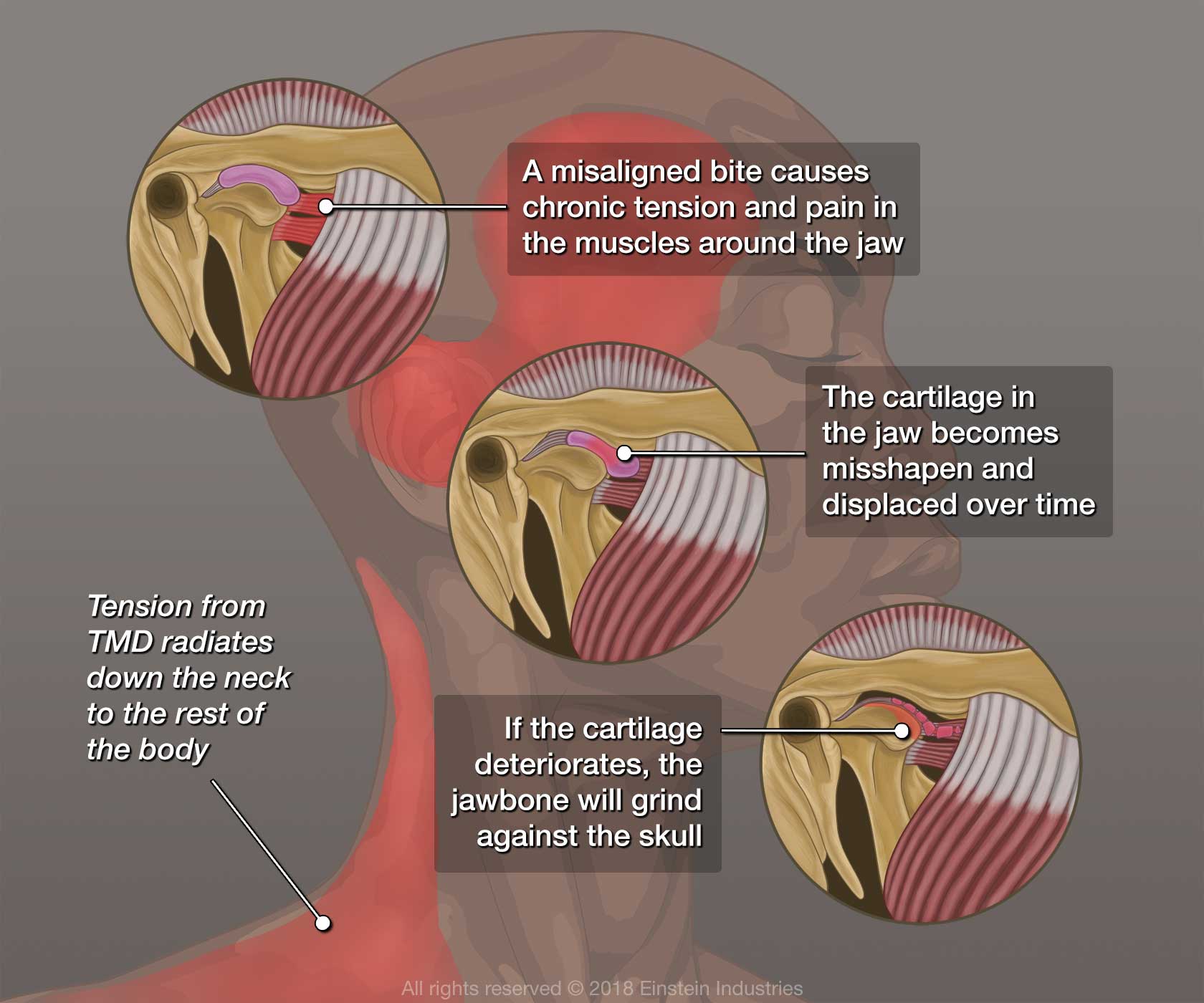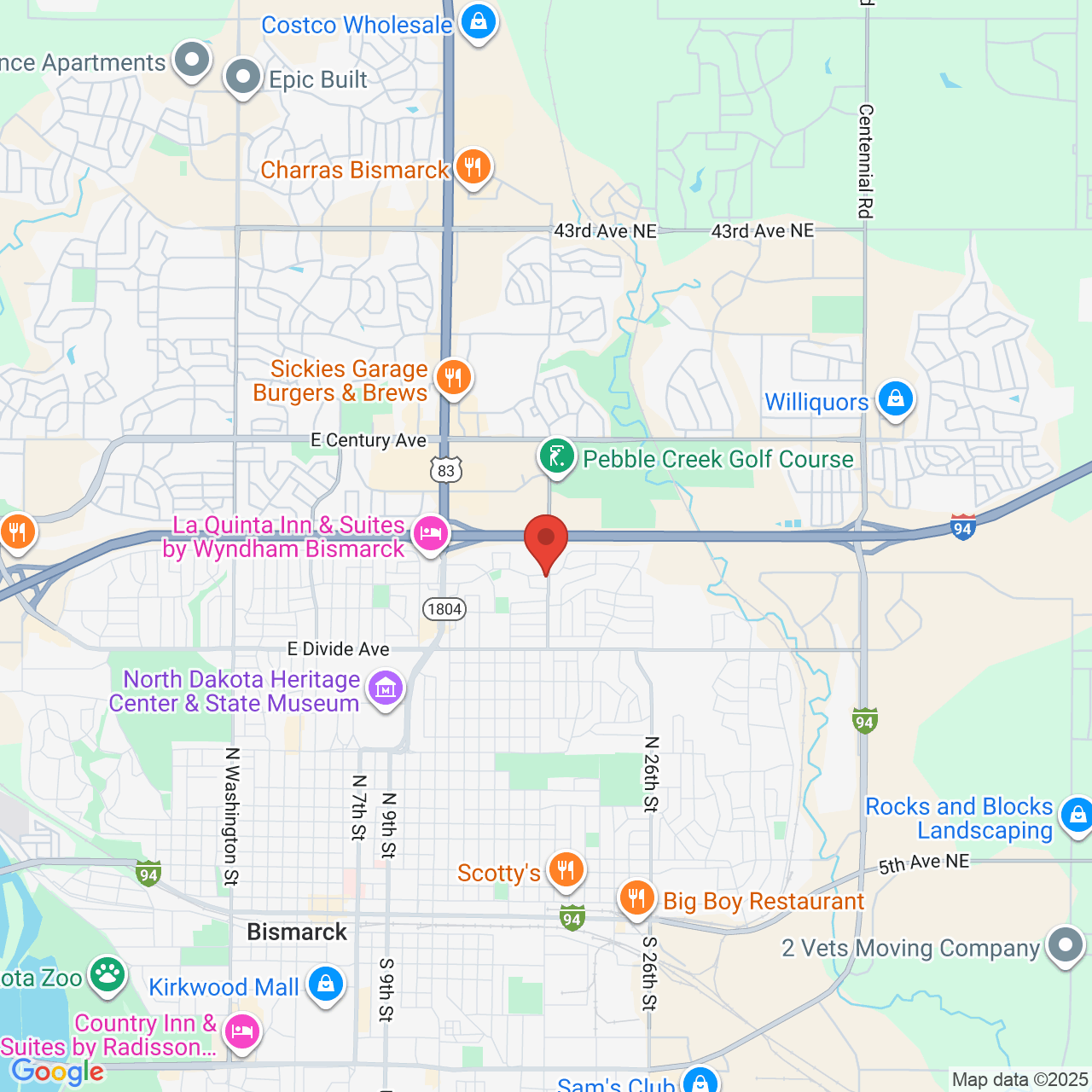
TMJ
Identifying TMJ and Potential Disorders
Temporomandibular Joint
The temporomandibular joint (TMJ) is the joint where the upper and lower jaws connect. The TMJs are used in motions including eating, speaking, and making facial expressions.
All of this movement can place a lot of pressure on your TMJs, especially if your jaws are misaligned or inflamed.
Temporomandibular Disorder
A temporomandibular disorder (TMD) happens when the jaw joint and the surrounding tissues do not function properly. TMD may result from issues involving the bone, cartilage, nerves, or muscles surrounding the mandible or cranium. Excess pressure on your TMJs can damage the joints, causing the soft discs inside to slip in extreme cases. Without these cushions, your jaw will grate together every time it moves.
Symptoms of TMJ Disorders
- Jaw pain
- Tenderness in the lower third of your face
- Discomfort in your neck, shoulders, and upper back
- Chronic headaches
- A stiff jaw
- Pain when eating
- A clicking noise when you move your jaw
- Ringing in your ears
- Face swelling
- Difficulty opening or closing your mouth all the way
Don't Let Jaw Pain Ruin Your Life Reach Out to Us to Find Relief
Patients who are experiencing TMJ pain report clenching and grinding their teeth often, which can lead to painful headaches, neck discomfort, and more. Issues with your temporomandibular joint will generally worsen without intervention, potentially leaving you with continual discomfort.
If you suffer from chronic jaw pain and are experiencing TMJ disorder symptoms, Heringer Dentistry can help you. Our dentist, Dr. Heringer, and his team of professionals can evaluate your jaw and provide a responsive dental treatment.
Request an appointment at our Bismarck, ND, office online or by calling:
(701)401-4772

A Closer Look at TMJ Disorder

"10 Out of 10"
All of the staff at Heringer Dentistry were all so extremely nice and very thorough with answering questions, and explaining what they were doing and what needed to be done. 10 outta 10, would recommend!
View on GoogleSeen quickly, very nice staff, explained things, answered my questions, knowledgeable when something the dentist said went over my head, in and out in about an hour for what I needed.
View on GoogleBenefits of TMD Treatment
Pain Relief
Patients with TMD symptoms may experience constant headaches, inability to fully open their mouth, and consistent pain every time they move their jaw. TMD treatment can manage these nearly-constant painful symptoms.Improved Long-Term Oral Health
TMJ disorders can cause patients to consistently clench and grind their teeth, a condition known as bruxism. By treating TMJ disorders sooner than later, patients can avoid damaging their teeth and protect their temporomandibular joints. If you do have damaged teeth, Dr. Heringer can discuss which restorative dentistry treatments are right for you.
Increased Quality of Life
Dealing with daily jaw pain and headaches can decrease your overall happiness. By addressing temporomandibular disorders, patients often experience better moods and have a more positive outlook on life. ;
Each TMD case is unique, so Dr. Heringer recommends TMJ treatments on a case-to-case basis. In many cases, a patient can address TMJ disorders through non-invasive procedures, along with self-therapy and lifestyle changes. In severe cases, surgery may be recommended.
Mouthguards
Comfort for the Temporomandibular Joint
Some TMJ disorder patients clench their teeth at night because their upper and lower teeth are not properly aligned. The jaw shifts to find a comfortable resting position and may keep moving if it cannot find one. This constant movement strains the bone, cartilage, and muscles around the jaw.
A mouthguard is an oral appliance that prevents direct contact between the upper and lower teeth. Also known as a night guard or bite guard, a mouthguard is worn while a patient sleeps. When a patient grinds or clenches at night, the mouthpiece lowers the amount of pressure on the teeth, jaw muscles, and jaw joints. This helps with pain relief and other symptoms that come with TMJ dysfunction.
Full Mouth Equilibration
Realigning Your Teeth to Improve Your TMJ
Misalignment or an imbalanced bite can cause a patient to grind their teeth while they're awake too. Full mouth equilibration consists of a series of custom splints designed to promote a more comfortable resting position for your jaw. The treatment can eventually improve your bite. This realignment reduces the urge to grind your teeth, which lessens stress on your jaw muscles and jaw joints.
TMJ Timeline Patients seeking TMJ treatment at our Bismarck, ND, office can expect to experience a similar timeline:
Day of Procedure
"Could Not Be More Satisfied"
Helped develop a plan for long term dental health. Very happy with the professionals there and the results.
View on GoogleMy experience with my cleaning and review this morning was outstanding! Becky did an exceptional job in cleaning my teeth without any pain or discomfort. Could not be more satisfied!
View on Google

